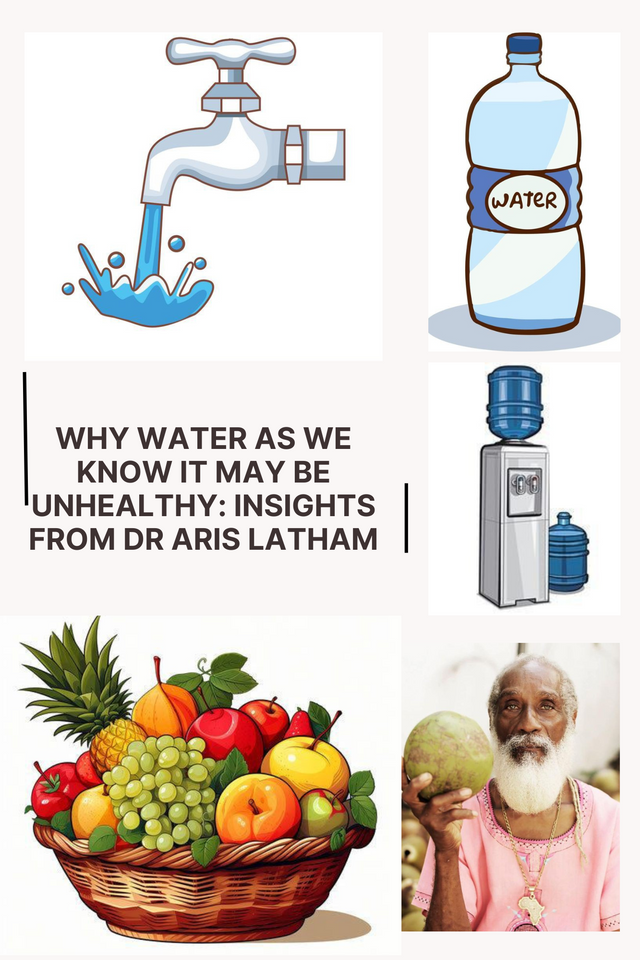Why Water as We Know It May Be Unhealthy: Insights from Dr Aris Latham

Dr Aris Latham, a renowned advocate for natural foods and raw foodism, has gained attention for his unconventional yet thought-provoking views on water consumption. He argues that the water many consume—whether from taps, bottles, or filtered sources—may not be the most beneficial for human health. Instead, Dr. Latham promotes a holistic and nature-aligned approach to hydration.
The Natural Perspective on Water
Dr Latham suggests that the healthiest form of hydration comes from water in its natural state, as found in living foods like fruits and vegetables. He emphasizes that humans should obtain water primarily through food rather than drinking excessive amounts of external water. This idea is grounded in the conclusion that the body thrives on structured water naturally in fresh, unprocessed plant foods.
Structured water, known as living or cellular water, exists in a gel-like state within plant cells. According to Dr Latham, this type of water is better absorbed by the body and enhances cellular hydration in a way that regular water cannot.
Concerns About Dead Water
One major critique Dr. Latham has of conventional water sources is that they often contain "dead water." He defines this as water stripped of its natural structure and vitality through processing, chlorination, or filtration. Tap water, in particular, frequently contains chemicals such as chlorine and fluoride, which he argues may negatively impact health over time. Even bottled water, often marketed as pure, is usually treated and stored in plastic containers, which can leach harmful chemicals like BPA.
Additionally, Dr Latham points out that distilled and purified waters lack essential minerals, potentially disrupting the body's natural mineral balance and leading to deficiencies.
The Role of Raw Foods in Hydration
Dr. Latham advocates for a diet rich in raw fruits and vegetables, which naturally contain high amounts of water. For instance, cucumbers, watermelons, oranges, and celery are over 90% water. He explains that this water is bioavailable—easily absorbed by the body—and comes with additional nutrients, enzymes, and fibres that enhance overall health. So, by relying on hydrating foods instead of plain water, Dr Latham believes the body can maintain its electrolyte balance more effectively, leading to better hydration and overall vitality.
The Overhydration Myth
Another aspect of Dr Latham's argument is that modern recommendations for daily water intake may be exaggerated. He asserts that drinking excessive amounts of water can strain the kidneys and dilute essential nutrients in the bloodstream, potentially leading to conditions like hyponatremia (low sodium levels). Instead, he advocates for mindful hydration that aligns with natural thirst signals and the body's needs.
Reconnecting with Nature
At the core of Dr. Latham's philosophy is the belief that humans have drifted away from their natural dietary and hydration habits. He encourages a return to consuming foods and liquids in their most natural states, arguing that this approach can help restore balance and health. His message aligns with the broader principles of raw foodism, affirming the healing power of living, plant-based foods.
Conclusion
While Dr Aris Latham's perspective challenges conventional wisdom about water, it invites deep reflection on how we hydrate our bodies and the potential impact of modern water sources on our health. By promoting hydration through raw, water-rich foods, he offers a path focusing on natural, nutrient-dense sources over chemically treated and processed alternatives. As with any health philosophy, it is essential to approach Dr. Latham's insights with an open mind and to consider individual needs and circumstances. However, his teachings underscore a vital principle: the closer we align with nature, the greater the potential for optimal health and well-being.